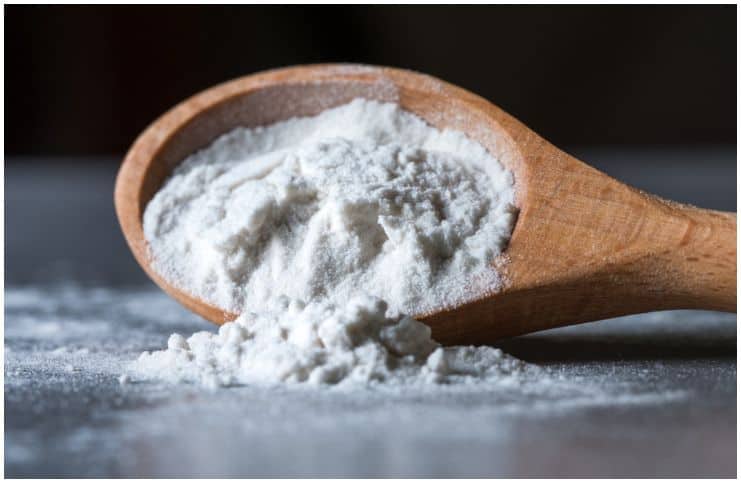Xylitol
It is a sugar alcohol or polyalcohol found in numerous vegetables, mushrooms, and fruits, and made from birch wood or corn to make a sweetener which is similar in taste to table sugar, however, with approximately 40 percent fewer calories.
In 1963, the U.S. Food and Drug Administration classified this sweetener and has approved its use as a “food additive.”
Sugar alcohols are like hybrids of an alcohol molecule and a sugar molecule. Their structure gives them the capacity to stimulate the sweet taste receptors on the tongue. They are regarded as a type of ”low-digestible carbohydrate,” a category that also includes resistant starch and dietary fiber.
The human body produces between 5 and 15 grams of this substance per day as it metabolizes carbohydrates.
It is widely used as a sugar substitute (in more than 35 countries) and in “sugar-free” mints, chewing gums, and candies. You can also find it in the content of some types of oral care products, like – mouthwash and toothpaste, since mouth bacteria can’t use it as a source of energy.
Also, it inhibits the attachment of Haemophilus influenzae to the nasopharyngeal cells and the growth of Streptococcus pneumoniae.
Side Effects
The main side effects reported from consuming foods and drinks containing this sweetener include – colic, borborygmi (better known as rumbling noises coming from your digestive tract), and a higher number of bowel movements.
According to Consumer Guide to Dentistry, if you consume more than 40 g of this sweetener per day, you may also experience bloating.
In 1985, the EU’s Scientific Committee on Food said that consuming more than 50g a day of this sweetener can cause diarrhea. Nevertheless, most people report that diarrhea subsides even as they continue to intake foods with this sweetener.
Additionally, it has been reported to raise blood glucose levels (it is even advertised as suitable for people living with type 2 diabetes), which actually suggests that people with diabetes shouldn’t consume it.
Since the small intestine absorbs only 50 percent of this sweetener, some scientists believe that it can accumulate in the liver and, ultimately, may have long-term toxic consequences.
Erythritol
It is a polyol or four-carbon sugar alcohol which contains approximately 60% to 70% of the sweetness of sugar. It can be naturally found in small amounts in fermented foods and some fruits, including – sake, wine, watermelons, beer, grapes, pears, and soy sauce.
In large-scale production, it is produced using non-pathogenic yeasts like non-GMO Trichosporonoides megachilensis or Moniliella pollinis to help ferment glucose.
In 1848, a Scottish chemist named John Stenhouse first discovered this sweetener. It is used mainly in baked goods, chewing gum, some prepackaged products, beverages, and candy.
In the human body, it is absorbed into the bloodstream in the small intestine, and then, for the most part (about 90 percent) excreted unchanged in the urine. Approximately 10 percent enters the large intestine (the last part of the gastrointestinal tract).
According to research, this sweetener does not contribute to decay like other forms of sugar, and it can reduce teeth plaque.
Side Effects
The European Commission’s Scientific Committee on Food, an independent European agency, has declared this sweetener acceptable as a food additive. Moreover, it is approved as an additive in nonalcoholic beverages, up to a concentration level of 1.6% by the FDA.
However, some consumers are sensitive to this sweetener and other sugar alcohols and may experience:
These side effects may occur because this sweetener is absorbed into the bloodstream and excreted in the urine instead of going through the large intestine for excretion.
In addition, 50 grams of this sweetener in a single dose increases stomach rumbling, according to a 2007 study published in the European Journal of Clinical Nutrition.
Moreover, consuming foods and drinks containing this sugar alcohol promotes loss of electrolytes and dehydration, leading to a feeling of excessive thirst. Also, if you have irritable bowel syndrome, it may aggravate your signs and symptoms.
Consuming foods sweetened with sugar alcohols can cause metabolic acidosis (buildup of acid in the body), which has an increased risk of cancer of the larynx, as per a study issued by the American Diabetes Association.
Sugar alcohols can also stimulate the reward section of the brain that has addictive characteristics or traits. This actually means that whether it’s a sugar-free cookie or a sugar-dense cookie, we are likely to eat more than we should since we ”LOVE” being rewarded.
Lastly, some research established that this sweetener is an effective insecticide (even if this looks like an advantage); it really not settles well as a consumed sweetener.
Bottom Line – Xylitol vs. Erythritol
We recommend this type of sweeteners (sugar alcohols) over artificial sweeteners (such as aspartame or Ace K) to anyone who needs a low-calorie sweetener. However, anyone who wants to be really healthy should stay on a whole food strict vegetarian diet.
Images credit – Shutterstock
READ THIS NEXT: Dipotassium Phosphate Side Effects
References https://www.ncbi.nlm.nih.gov/pmc/articles/PMC5320817/ https://www.uofmhealth.org/health-library/hn-3983008

Xylitol is VERY POISONOUS to dogs, even very small amounts may cause death. Foods that are fine for humans are not always fine for non-humans.